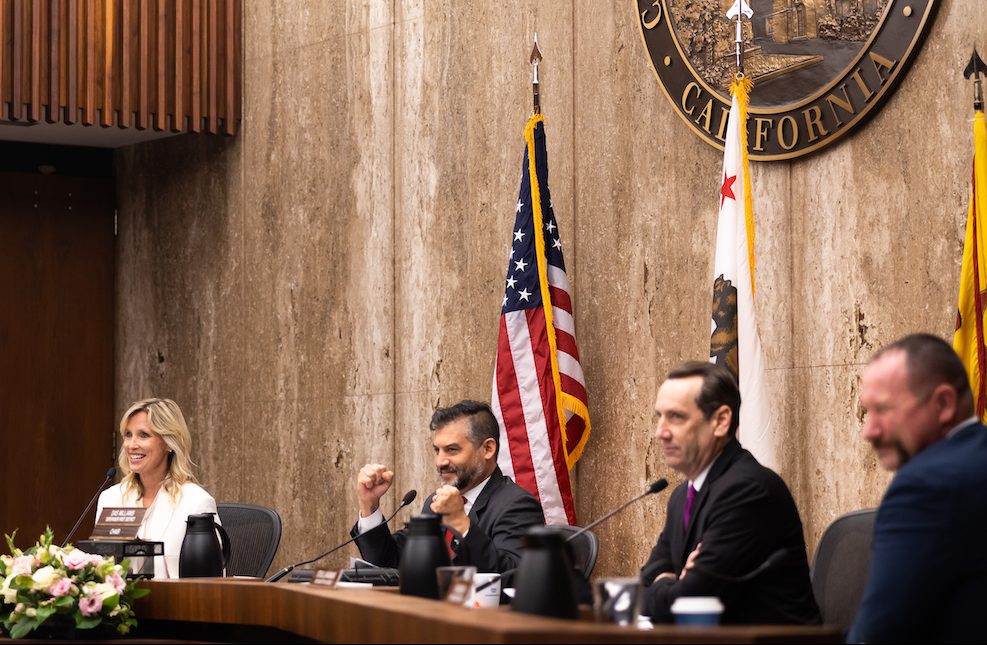Amid the ceremonial pomp and circumstance typically attending the changing of the guard among the county supervisors, some hard and gritty reality sandwiches were served up, though with an abundance of good humor and kumbaya attitude. County Supervisor and outgoing board chair Joan Hartmann didn’t just give Das Williams, the newly anointed chair, the ceremonial gavel he’ll need to wield to bang meetings to order; she also gave him a large and uncommonly bulky satellite-powered emergency telephone assigned to the board chair. Williams will need this phone if and when emergencies — whether natural and unnatural — occur. Williams immediately dubbed it “the Batphone,” riffing on the device used by the caped crusader when communicating with Commissioner Gordon.
It was precisely because of major emergency — the recent storms that triggered mass evacuations and no less than 21 state, county, and federal emergency declarations — that this week’s ceremonial festivities did not occur the first week of January, when they were originally scheduled. Hartmann noted that when she passed on the gavel five years earlier, the county had just weathered the 1/9 Debris Flow, the Thomas Fire, the Whittier Fire, the El Capitan Debris Flow, and the Isla Vista bluff collapse. The past year, she laughed, had appeared relatively calm in comparison until, of course, until the January 9 rains bombarded Santa Barbara County.
To the extent the new normal is anything but, Supervisor Williams was quick to affix blame on climate change. It is, he said, the existential threat banging loudly on the county’s door. Williams’s new title as board chair conveys more symbolic import than actual enhanced authority — he still remains just one of five votes — but it allows him to set a tone and vibe that’s idiosyncratically and programmatically distinct.
This Tuesday, Williams wasted little time articulating a vision focused on climate change. With 55 percent of the county’s greenhouse gases generated by tailpipe emissions, Williams made it clear he will be focusing on reducing the number of vehicle miles traveled. Housing, he said, needs to be located close to jobs. The long commutes so many people make from their jobs in Santa Barbara to their homes in other communities, he said, was “tearing the fabric of society apart.” It was also, he said, damaging the environment.
Williams cut his teeth politically as a slow-growth environmental activist and strategist fighting development in the Goleta Valley and Santa Barbara. “We all got into preservation,” he said, “to save the environment.” Subsequently, he said, he has concluded that approach inflicted damage on the environment. “It should cause us to reevaluate our priorities.”
For those wondering which way — and how hard — Williams will tilt when proposed new housing projects collide with environmental concerns, such remarks should prove illuminating in the months ahead. Williams also touted a $750 million agreement the county just signed to receive 200 megawatts of energy development from a compressed-air development still on the drawing boards in Kern County. That project, Williams said, is the first in the world to generate electricity from compressed air without using natural gas. The Central Coast, Williams added, will need three times that amount to meet state clean-energy-requirement mandates.
In recent years, relations among county supervisors have proven exceptionally collegial despite serious ideological differences. Williams chalked that up to the high degree of trust that exists among the supervisors. Previous chairs — supervisors Hartmann, Bob Nelson, and Gregg Hart — were notably even-keeled in style and tone, and Williams on occasion would play the role of political fire-breather. How he adjusts to the new role has yet to be seen.
Newly elected 2nd District Supervisor Laura Capps, dressed in suffragette white, called out former supervisors Susan Rose, Gail Marshall, Doreen Farr, and Janet Wolf, who showed up for the occasion. Capps will be focusing on issues of poverty, particularly as it affects women and children.
Capps ran unopposed for the 2nd District seat, so technically there was no election. Also running unopposed was 5th District Supervisor Steve Lavagnino, who joked that he was sworn in while standing in the same line as people returning Christmas gifts at a UPS storefront in Orcutt. The January storms, he recounted, caused the traditional swearing-in ceremonies to be canceled. He chose the UPS storefront, he said, because it had a notary public, which was necessary to make the swearing-in legal.
Tuesday’s ceremony was orchestrated and curated by Williams and his staff. It featured Williams’s ecumenical range of religions and causes. Rabbi Daniel Brenner of Congregation B’nai B’rith spoke, noting how Moses achieved great results only after being exhorted by his father-in-law Jethro to “delegate tasks.” Iranian human rights advocate and UCSB psycholinguistics professor Aazam Feiz played the Grammy-winning recording “Baraye” by Iranian poet and singer Shervin Hajipour. In the first two days after Hajipour released his song — an exaltation of human rights that fused together multiple hashtags such as “For Our Forced Heaven,” “For Our Sisters,” “For Kissing in Public,” and “For Changing These Rusted Minds,” into one cohesive whole — more than 40 million people had listened to it. Naturally, Feiz noted, he was arrested but then later released in the face of international outrage. After winning the Grammy, she said, Hajipour had been arrested yet again. After playing the song, Feiz then went through it line by line, explaining its relevance to the repression now taking place in Iran.
Support the Santa Barbara Independent through a long-term or a single contribution.

